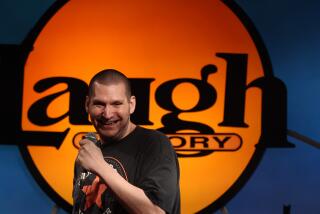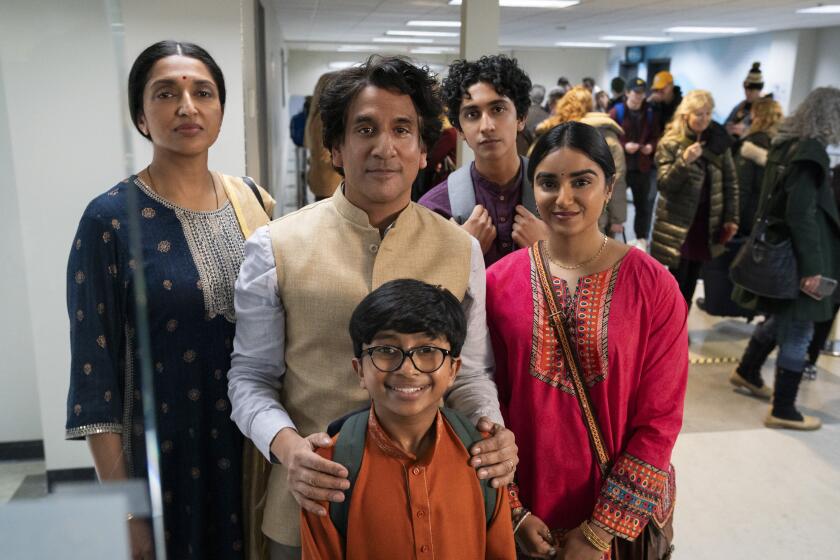Gifts of language continue in ‘Cyrano’
Nearly a decade ago, an improbable dream came true for Deaf West Theatre and its founder, Ed Waterstreet. The small, L.A.-based company went to Broadway with its signed and spoken version of the musical “Big River: The Adventures of Huckleberry Finn.”
Even as he savored their success, Waterstreet had another dream — creating an original musical inspired by Edmond Rostand’s “Cyrano de Bergerac.” What better tale for his theater to tell than one that explores the universal desire to express oneself?
This spring, “Cyrano” is making its debut, albeit as a straight play. Stephen Sachs’ modern-day adaptation, which is directed by Simon Levy, opened to acclaim in April at the Fountain Theatre in Hollywood and runs until early July. The co-production represents a reunion of old friends — the Fountain gave Deaf West its first home and Sachs, the Fountain’s co-artistic director, is one of its longtime collaborators.
Sachs says the show also has turned out to be “a special farewell to Ed” since the 69-year-old Waterstreet, whom he calls “a delicious mixture of bulldog and teddy bear,” has retired after two decades as his company’s pioneering artistic director.
“Cyrano” marks a beginning as well, as it is Deaf West’s first production under new artistic director D.J. Kurs.
“I want to build on the tradition and passion Ed brought while keeping us moving forward,” says Kurs, 34.
Rostand’s 19th century drama about a 17th century soldier-poet has been reset in a world with Facebook and Starbucks. In the original, Cyrano fears rejection because of his huge nose, so he secretly uses his way with words to help his comrade Christian woo beautiful Roxanne.
In Sachs’ story, a poet believes his deafness will ruin his chances with a hearing woman named Roxy, especially after he learns she’s fallen for his hearing brother, aging rocker Chris. This Cyrano pinch-hits for his less-than-eloquent sibling via text and email.
“Technology has opened up the world” for the deaf community, the playwright says, although it can be a blessing and a curse for someone like Cyrano, “who connects back to a more romantic age.” Sachs’ hero — brash, brilliant and yet plagued by self-doubt — often feels he’s out of place, not fitting in with the hearing and choosing not to fit in with the deaf.
Sachs and Levy have integrated e-language into Deaf West’s trademark blending of signed and spoken language presented by deaf and hearing performers for deaf and hearing audiences. Flat-screen monitors glow with online messages while actors such as Troy Kotsur, who plays Cyrano, express with their hands and faces what Sachs calls the “intimate, visceral, kinetic” beauty of American Sign Language. (The ASL translation was created by two ASL masters working with the actors, director and playwright.)
Sachs discovered the richness of sign language in the late ‘80s when he observed the interpreter at a play he was directing. He began holding workshops with deaf actors and writers; when he and Deborah Lawlor founded the 78-seat Fountain in 1990, he hoped to start a deaf theater company as well. Then he heard about Waterstreet, a National Theatre of the Deaf veteran who wanted to establish a company for deaf artists like himself.
The Fountain offered Waterstreet office space, from which he launched Deaf West in 1991. In its first show, “The Gin Game,” actors signed while hearing audience members listened to the dialogue on infrared headphones.
Deaf West ventured out on its own in 1993, eventually settling in North Hollywood. The company has gained a national reputation for expanding opportunities for deaf artists and defying expectations — especially by pursuing what Waterstreet calls “that crazy idea, the deaf musical.”
Just as “wonderfully crazy,” he adds, was the notion that such a musical could reach Broadway. “Big River,” which was directed by Broadway veteran Jeff Calhoun, opened in North Hollywood in 2001, moved to the Mark Taper Forum in 2002 and, in 2003, landed in New York, where it earned two Tony nominations and a Tony honor for excellence in theater.
Deaf West achieved its goal of presenting an original musical in 2007 with “Sleeping Beauty Wakes,” which opened at the Kirk Douglas Theatre with a book by Tony-winner Rachel Sheinkin and a score by Brendan Milburn and Valerie Vigoda of indie pop-rock’s GrooveLily. That Center Theatre Group co-production was followed by another, “Pippin,” in 2009.
Over the years, Sachs has continued to create work related to deaf culture. His “Sweet Nothing in My Ear,” inspired by the debate over cochlear implants, debuted at the Fountain in 1997 and was made into a TV movie. For Deaf West, he has directed two plays and written two others. His drama “Open Window,” in which a deaf young man is accused of killing the father who kept him chained in the basement, premiered in 2005 at the Pasadena Playhouse in a co-production between Deaf West and the playhouse.
When Waterstreet suggested collaborating again, Sachs asked about “Cyrano.” “Ed told me they had kicked it around, but it never got off the ground,” he says. So he proposed his modern-day version.
Kurs hopes the strong response to the show, which has been extended through July 8, will attract donors who can help ease the financial challenges Deaf West has faced after the loss of crucial federal funding, starting with a major cut in 2004. He is seeking additional funding sources for the company, which receives foundation, individual and local and state government support. Meanwhile, Deaf West has reduced its staff and rented out its theater during 2012.
Looking beyond “Cyrano,” Kurs is considering possibilities for the next production, which is scheduled for early 2013.
Waterstreet says he decided to leave at the end of last year but didn’t officially retire until Kurs, a former Deaf West artistic associate, was appointed in January. “The theater is still my baby,” he adds, noting that he plans to help with fundraising.
Returning to the Fountain for “Cyrano” proved to be what he calls “a very nice homecoming. … I had tears in my eyes as I saw the play for the first time in the space where we had so many memories.”
On opening night, Sachs sat behind Waterstreet as they watched the world premiere, deaf and hearing actors and an array of high-tech screens filling the stage where Deaf West got its start two decades earlier.
“At intermission, Ed leaned over to me,” Sachs recalls. “He said, ‘Wow! Look at all this. Look at how far we’ve come.’”
More to Read
The biggest entertainment stories
Get our big stories about Hollywood, film, television, music, arts, culture and more right in your inbox as soon as they publish.
You may occasionally receive promotional content from the Los Angeles Times.










